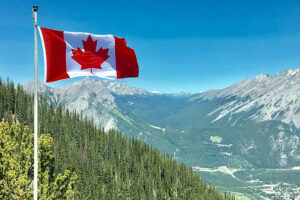Canada’s Cigar History
Canada is an area of natural beauty where you can find stunning glaciers, secluded lakes, and deep enchanted forests. Few countries can boast such natural wonders and a stunning landscape full of surprises.
There is more to this country than its exquisite scenery, from thriving cities and rich history to successful business.
Canada was once home to a massive cigar industry, and from the late 1870s, cigars were locally grown, manufactured, and distributed. By the early 1900s, Canada had produced over 40 Canadian manufacturers for a population of only seven million.
Join us as we look back at Canada’s cigar history and assess the country’s relationship with the tobacco industry today.
A gift from the First Nation Settlements
The history of cigars in Canada began when the First Nation settlements introduced wild tobacco to white settlers. Before European settlers arrived, tobacco was used by the indigenous peoples of Canada for a range of purposes, including ceremonial and medicinal.
The First Nation Settlements often rolled tobacco leaves into pipes for smoking, and their excellent knowledge of tobacco and its uses played a significant role in the development of Canada’s tobacco industry.
After introducing settlers to tobacco, smoking spread across Europe. However, it wasn’t until the 19th century that tobacco production for commercial purposes began to take off.
After this, smoking tobacco gained popularity, and Canadians began to plant tobacco seeds imported from other countries, such as Indonesia and the US.
The industry then grew into one of Canada’s most prosperous business endeavors. Norfolk County in Southwestern Ontario became the center of the country’s tobacco belt and continued to dominate the region through the 19th and early 20th centuries.

Canada’s tobacco boom
During Canada’s tobacco boom, smoking became incredibly popular worldwide. Canada began planting local tobacco seeds and those imported from other countries, including Indonesia and the US. As successful growers and cigar manufacturers, they then sold premium cigars to other countries
However, with the arrival of higher quality and more affordable cigars available from the US and Cuba, Canada’s tobacco farms couldn’t compete.
As a means to get by, the industry shifted to growing tobacco for cigarettes instead of cigars. The farms in the tobacco belt had a heyday in the 1950s and 1960s, but Cuban cigars have since dominated the Canadian cigar market.
Global competitors
Global competitors took the limelight from Canada, especially Cuba. However, when the US banned Cuban imports as a result of the revolution during the 1920s, there was space for Canada to answer the American demand for premium cigars.
While the US ban on Cuban cigars made way for Canada, it had a forbidden fruit effect that increased interest around the world, putting Cuba on the map for cigar lovers.
The US had its own cigar boom in the 1990s, and other global competitors began to manufacture their own produce. The once very successful Ontario tobacco belt experienced a staggering decline. To make matters worse for the Canadian tobacco industry, a smoking ban was passed by the Ontario government.
This ban was described as ‘the most aggressive anti-tobacco legislation in North America.’ It meant smoking was no longer allowed in indoor public spaces such as workplaces, restaurants, casinos, or on public transport.
Tobacco farmers in the area received buyouts for their crops in 2008, totaling $300 million. Farmers signed agreements to plant anything except tobacco, moving on to other crops instead.
The ban left fewer than 1,000 tobacco farmers in Canada, most of whom only carried out minor operations. Space was made for global competitors and Canada took a step back.
A New Outlook
Canada has implemented regulations on tobacco products, however. These include warning labels, advertising restrictions, and high tobacco product taxes that have impacted the industry, making cigars more expensive and less accessible to consumers.
However, Canada and Cuba share a mutually beneficial trade agreement that does not prevent the import of Cuban cigars. There have never been any trade restrictions with Cuba, meaning Canadians can buy Cuban cigars legally from local cigar shops. While Canadian’s may no longer be renowned as manufacturers, there’s nothing stopping them from sampling produce from around the glove.

Comments